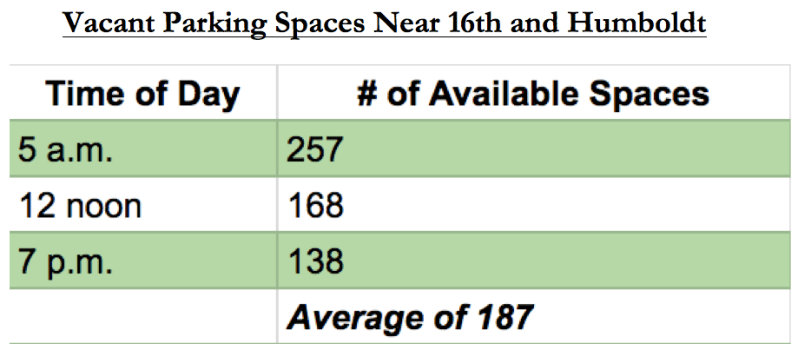Simple Data Shatters The “There’s No Parking” Myth

Concerns over a parking shortage that prompted a change to the city’s housing policy are completely overblown, according to a newly released parking inventory from Denver Public Works [PDF].
The Denver City Council is on the verge of baking expensive parking requirements into the zoning code that will slow the growth of Denver’s inadequate housing supply and make new homes less affordable. At the core of this policy change are a few loud residents, terrified of losing on-street parking spots to newcomers, who claim there’s no room for new apartments because there’s no place left to park.
“The street parking potato sack is full,” they say. “There is no more room for more potatoes.”
Some Council members have, er, eaten this argument up. To justify new parking requirements on small lots, they simply point to their constituents’ concerns over the purported parking shortage. A proposed 108-unit development at the corner of 16th and Humboldt in City Park West sparked the outrage.
But the parking inventory paints another picture. Workers counted how many cars each block holds, and recorded how many empty spaces were available on a Tuesday, Wednesday, and Thursday. On a given weekday, an average of 187 on-street parking spaces were available in a three-block radius of this intersection: 138 at 7 p.m., 168 at noon, and 257 at 5 a.m.

The majority of parking spaces in the vicinity are unrestricted or restricted to two hours between 8 a.m. and 6 p.m., which favors residents who park their cars overnight.
“While we try to collect data on days we feel best reflect normal conditions, it’s still a snapshot in time,” Cindy Patton, with DPW’s Transportation and Mobility division, said in an email.
Of course on-street parking availability fluctuates. But the snapshot disintegrates the “there’s no parking” myth established by the not-in-my-backyard crowd, and validated by Council, which voted 7-6 this week to advance the parking requirements to a May vote.

There is, quite literally, always a parking space available for residents. If there wasn’t, they’d still be circling the neighborhood today after coming home from work last night. A more accurate representation of the “problem” current residents face is that there might not always be a parking space in front of their homes, available on-demand.
This slight inconvenience is why City Council is considering a change to Denver’s housing policy that would exclude new residents, dilute walkability, and make housing less affordable. But the final vote is not until May. Given Monday’s vote, the margin of support could be thin enough to change.


